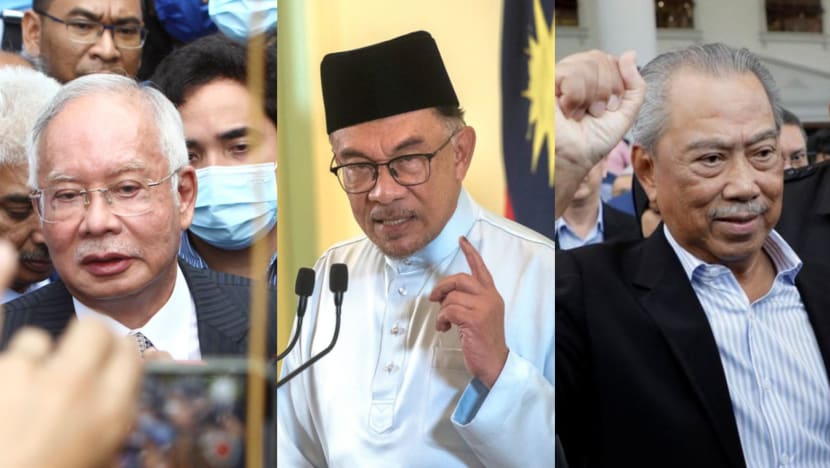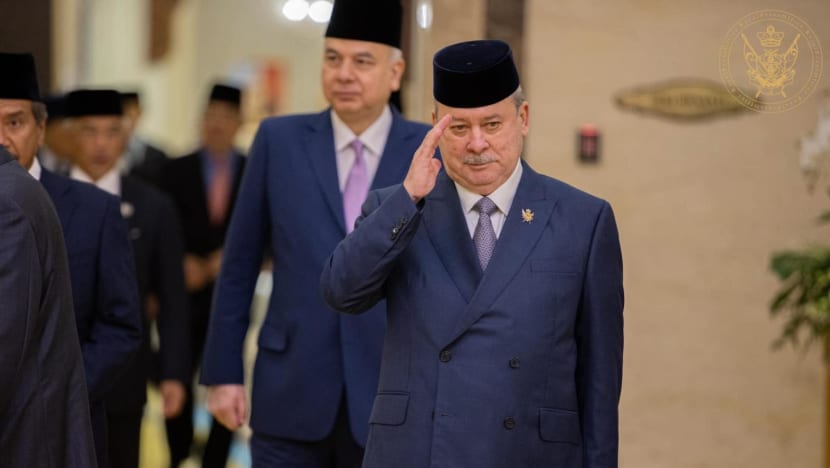Commentary: How a royal pardon for jailed former PM Najib could rock Malaysia politics
The application for a pardon to Najib Razak’s 12-year jail sentence for 1MDB-related corruption convictions could soon be considered. If granted, it would impact the top political figures in Malaysia, including Prime Minister Anwar Ibrahim, says James Chin, Asian Studies professor at the University of Tasmania.

Composite photo (from left to right): Former prime minister Najib Razak who is currently serving a jail sentence on graft convictions related to the 1Malaysia Development Bhd scandal (Photo: AP Photo); Malaysia Prime Minister Anwar Ibrahim (Photo: AP Photo/Vivian Loo); opposition leader Muhyiddin Yassin (Photo: Reuters/Hasnoor Hussain).

This audio is generated by an AI tool.
HOBART: The Pardons Board could soon decide on the fate of Najib Razak - the first Malaysian prime minister convicted for corruption and currently serving a 12-year jail sentence.
Even behind bars in Kajang Prison, he remains a hugely influential figure in Malaysian politics. His application for a royal pardon could set in motion a rocking of the political chessboard.
A pardon would have an immediate impact on the four most important political personalities in the country: Prime Minister Anwar Ibrahim; his deputy Ahmad Zahid Hamidi who is United Malays National Organisation (UMNO) president; de facto opposition leader Muhyiddin Yassin, as well as Parti Islam Se-Malaysia (PAS) leader Abdul Hadi Awang.
The legal effect of a full royal pardon will be as if the trial and conviction never took place. Najib would be free to pick up his political career where he left it in August 2022.
Mr Anwar is no stranger to this legal process: He was given a royal pardon after his Pakatan Harapan coalition took power in 2018 and resumed his political career.
Listen:
QUIET RIPPLES AGAINST ANWAR IBRAHIM
There are two immediate concerns for Mr Anwar - both to his detriment.
As a member of the Pardons Board, Mr Anwar risks being tarred by critics as being complicit - if not playing a major role - in securing Najib’s pardon.
The laws are clear: Granting pardons is the sole exclusive right of the Agong, as the king is called in Malaysia. Mr Anwar can only offer his views, nothing more.
Still, public perception would be that Mr Anwar was back-pedalling on his anti-corruption drive, especially after corruption charges against Deputy Prime Minister Ahmad Zahid were dropped last year.
The second is that Najib could destabilise Mr Anwar’s unity government by resuming a leadership position in UMNO. Nobody in Kuala Lumpur believes that Najib will go quietly and retire from active politics.
Making a comeback would be relatively easy. There is still strong support for Najib in his home state of Pahang.
Two of his sons were elected in UMNO party polls during his incarceration: Eldest son, Nizar Najib, was elected the Pekan division vice-chief while Nazifuddin Najib was elected division chief in Langkawi.
Any move Najib makes will reverberate in UMNO, already seen as a liability for the unity government after a poor showing in six 2023 state elections.
UMNO’S AHMAD ZAHID WITH THE MOST TO LOSE?
If UMNO is at risk of a shake-up, the worst-case scenario could be for party president Ahmad Zahid.
The next internal polls for UMNO presidency is due in three years, about the time of the next general election (GE16). If Najib starts campaigning in the background for the job, it will create uncertainty in UMNO and may weaken Mr Ahmad Zahid’s sway in the unity government.
A pardoned Najib could also opt to lay low and wait to see how well UMNO does at GE16. This way, he can play a role in putting together a new coalition.
Whether he goes for the prime ministership or not, his base guarantees him a key role in any new government. When a potential pardon takes effect and how much time it leaves him to manoeuvre will be a strong consideration here.
The most strategic move will likely be for Najib to use his influence to boost his sons’ careers and secure his political legacy, instead of challenging Mr Ahmad Zahid. It would be a win-win for both: It will take time for the sons to rise, so if Najib is willing to wait, why not?
MUSIC TO MUHYIDDIN YASSIN’S EARS
For Mr Muhyiddin, the prospect of Najib making a comeback will be music to his ears. Someone who can split UMNO could precipitate the fall of the unity government.
One complication is bad history between the two men. Mr Muhyiddin will never forget he was sacked from UMNO in 2016 by Najib. But in Malaysian politics, the overriding objective always trumps personal animosity.
Mr Muhyiddin’s immediate problem is stop his own assemblymen from unofficially defecting to Mr Anwar’s side, so courting Najib to Parti Pribumi Bersatu Malaysia (Bersatu) may change the whole political scene.
However, this is unlikely to happen. Najib will not join Bersatu unless the party can offer him a clear path back into power and that will not happen as long as Mr Muhyiddin still fancies himself a prospective prime minister.
RISING THE GREEN WAVE WITH PAS?
If Najib cannot manoeuvre his way back to the UMNO presidency, his only path back to the prime ministership will be through opposition coalition Perikatan Nasional (PN). With Bersatu out of bounds, that leaves PAS.
This may sound incredible to many, but let’s not forget that Dr Mahathir Mohamad, who used to be its political enemy number one, is now calling on Malay voters to choose PAS.
The calculus may be simple: PAS has the political momentum for GE16 after the “green wave” of GE15 and strong follow-up at the 2023 state polls. PAS leader Hadi Awang has already said many times that he has no interest in the prime ministership.
Since GE15, PAS has been regarded as a mainstream Malay party so Najib will have no problem explaining it to hardcore UMNO supporters.
THE ONLY OPINION THAT MATTERS
All the anticipation over Najib may still come to nothing.
The Pardons Board may simply not consider the application in its next session and kick it down the road to when the new Agong rotates into power on Jan 31. Or the Pardons Board could commute his 12-year sentence to a lesser one, for example four or five years, which still prevents him from influencing GE16 in a major way.

The political establishment cannot totally ignore Najib, given his political pedigree and support. But it might be hesitant to align too closely with him, if his conviction and role in the 1MDB scandal are perceived to have tarnished Malaysia’s reputation internationally.
Hence making him less politically relevant by removing him from the GE16 process would probably be their best-case scenario. The more elections Najib misses, the harder it will be to make a comeback.
At the end of the day, the only opinion that matters is that of the King. He has to make all the political calculations on whether to grant a pardon, postpone the decision, or commute the sentence in such a way that Najib will be limited politically.
In many ways, the King is in a unique position to assess this since he is probably the person with the least political interest in Najib’s pardon.
James Chin is Professor of Asian Studies at the University of Tasmania and Senior Fellow at the Jeffrey Cheah Institute on Southeast Asia.




















